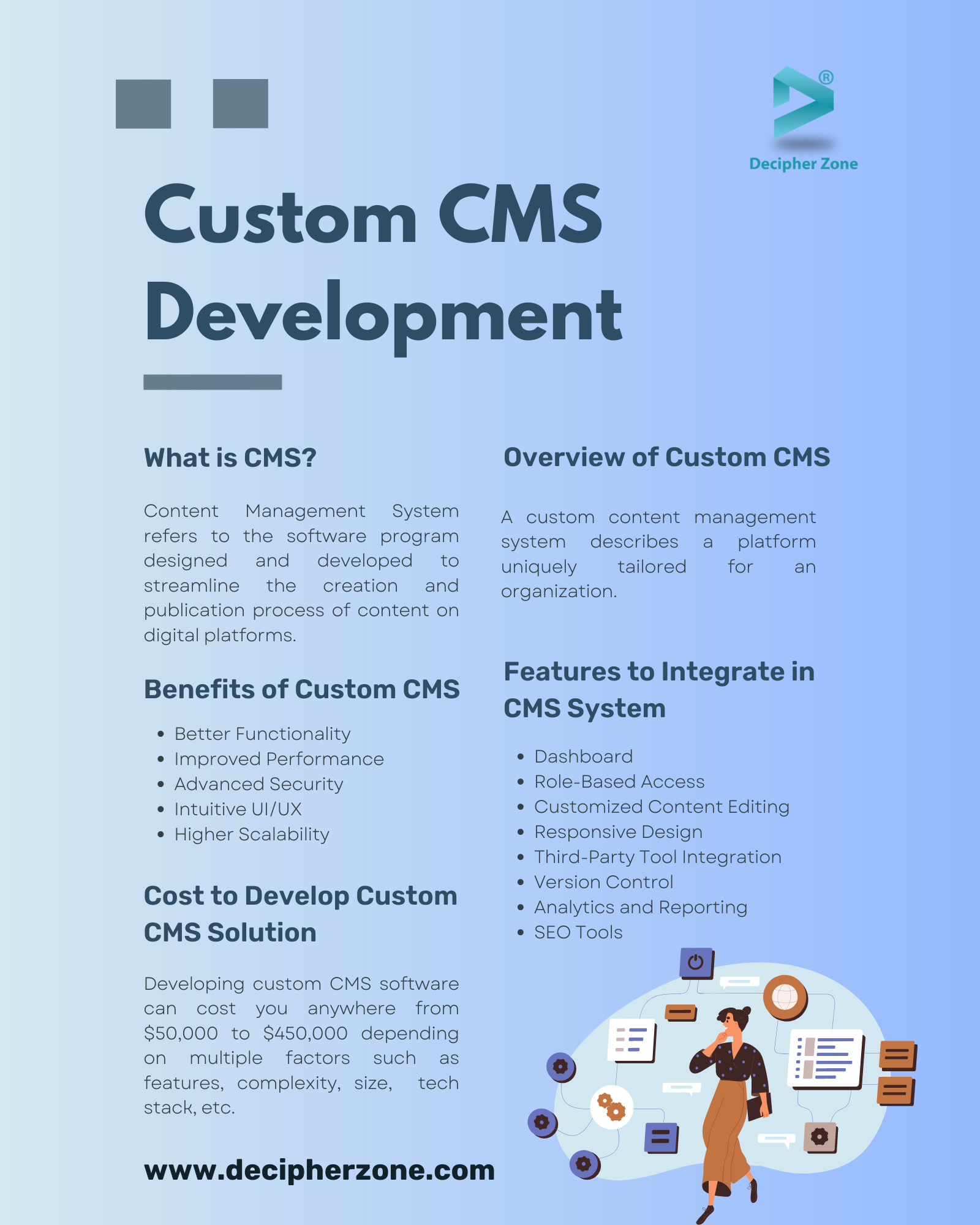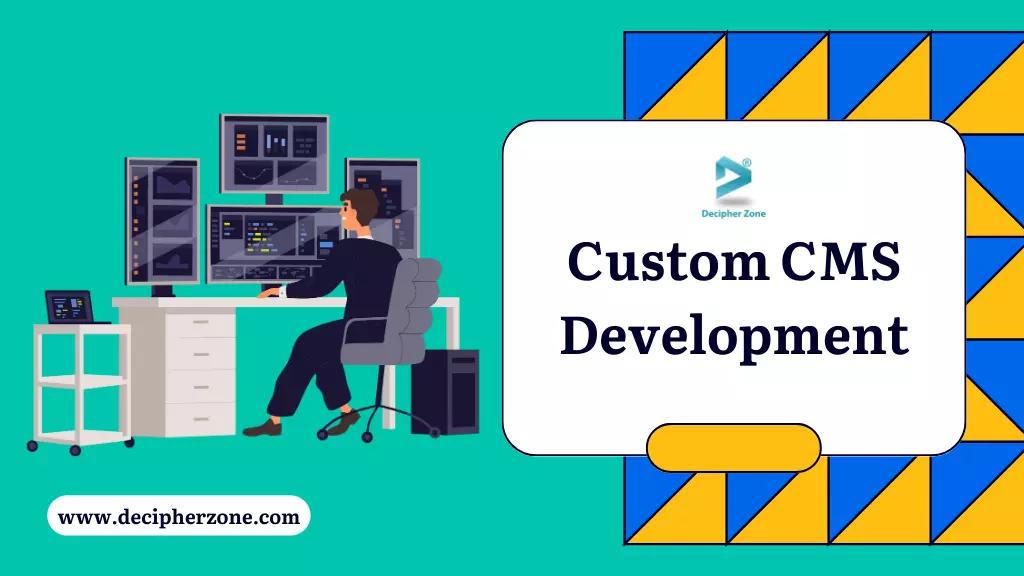Custom CMS Development. Custom CMS (Content Management System) Software Development: Benefits, Features & Cost. What is a Content Management System?
Have you heard about CMS software? Should you develop one for your business? This blog will help you understand CMS software and whether you should invest in one.
With so many content management systems in the market, is it important to customize one for your business? The answer to this question depends on whether you want to expand your business.
While an open-source CMS like Drupal or WordPress is publicly available and can be easily redistributed, modified, and copied for different purposes. On the other hand, custom CMS software becomes a proprietary solution for one organization, helping expand a business, improve services, increase sales, and grow.
But wait, what is a content management system? To help you understand CMS software, we will cover everything you should know, including what it is, its benefits, features, and development cost.
What is a Content Management System?
The term Content Management System or CMS refers to the software program designed and developed to streamline the creation and publication process of content on digital platforms. CMS software enables users to easily create, organize, edit, and publish content without technical knowledge. It also allows content creators and editors to collaborate seamlessly through its user-friendly interface.
Read: Custom Mobile App Development
And a custom content management system describes a platform uniquely tailored for an organization. It can also help manage different aspects of a business website, like e-Commerce, content management, and automated marketing.
Read: Custom Web Portal Development
Benefits of Custom CMS Software Development
Some of the reasons why as a continuously growing business you should invest in custom CMS software are as follows:
-
Better Functionality
-
Improved Performance
-
Advanced Security
-
Intuitive UI/UX
-
Higher Scalability
Better Functionality: Using an off-the-shelf CMS solution requires a user to adapt according to the preset features and functionalities. On the other hand, developing a custom CMS software solution for your business allows you to integrate features and functions that suit your unique requirements.
Improved Performance: Unlike ready-made software systems that are developed to be versatile for the wider audience, a custom content management system does not contain chunks of useless code and only offers features the client needs. This in return improves the loading speed, performance, and SEO ranking of the CMS platform.
Advanced Security: As the code of off-the-shelf, open-source CMS can be accessed by everyone, making vulnerabilities visible to the public and increasing the risk of being targeted by cyber attackers. However, when it comes to custom CMS, the code is only accessible by the development team or client, therefore, improving the security of the platform. Apart from that, in a custom CMS, developers can also add advanced security features such as two-step authentication, firewalls, SSL encryption, etc.
Intuitive UI/UX: Ready-made CMS software provides a wider range of templates, color schemes, and website-building features that may or may not suit the requirement of every business. However, custom CMS solutions are entirely designed based on the brand identity guidelines provided by the client, making the UI/UX intuitive and optimized for the users.
Higher Scalability: Custom CMS solutions are developed by keeping the future plans and strategy of the client’s business in mind, making it easier to scale, load, and improve the platform in the future.
Read: Custom Web Application Development for Business Success

Features to Integrate in Custom CMS Software Development
Now that we know what custom CMS software is and its benefits. Let’s move ahead and learn about the absolutely must-have features to integrate into it. These features are:
-
Dashboards
-
Role-Based Access
-
Customized Content Editing
-
Responsive Design
-
Third-Party Tool Integration
-
Version Control
-
Analytics and Reporting
-
SEO Tools
Dashboards: Integrating the admin dashboard in the CMS solution will allow you to manage different tasks like tracking user activity, monitoring threats, and scheduling content, reviewing analytics a lot easier.
Read: Web Application Development
Role-Based Access: Adding this feature will allow admins to set permissions for different users according to their roles. Put simply, role-based access helps the admin to control who can create, publish, edit, or delete content from the platform.
Customized Content Editing: Implementing this feature in the custom content management system will allow non-tech users to effortlessly update, manage, publish, and edit different content like images, videos, text, etc.
Responsive Design: Making the custom CMS responsive, allows the content of the system to adapt according to the different display sizes of the device being used to access it.
Third-Party Tool Integration: It should also provide the ability to integrate third-party tools and services to add programs that are not included in the system beforehand, such as CRM systems, chatbots, email marketing tools, etc.
Version Control: Adding version control in the custom CMS software will allow admins to revert to the previous version if the new one is not working as expected.
Analytics and Reporting: Indulging analytics and reporting tools in the custom CMS solution will allow the admin to track user engagement, website traffic, conversion rates, bouncing rate, etc.
SEO Tools: The custom CMS solution should also have built-in SEO tools that help users create SEO-friendly URLs, check the readability score of the content, set keywords and meta descriptions, etc. to help rank the content on search engine results pages.
Read: Custom Telecom Software Development
Cost to Develop Custom CMS Software
Developing custom CMS software can cost you anywhere from $50,000 to $450,000. The development cost varies depending on the features, complexity, size, platform compatibility, tech stack, outsourced development team experience, hourly cost, configurations, etc.
Read: Custom Accounting Software
We have just provided a rough estimate of the custom CMS software development cost. However, to get an accurate development cost estimation, you need to get in touch with our experts, share your project requirements, outsource experienced developers, and decide on the technology and third-party integrations to be used.
FAQs: Custom CMS Software Development
What is custom CMS Software?
A custom content management system describes a platform uniquely tailored for an organization
How much does custom CMS development cost?
Developing a custom CMS software can cost you anywhere from $50,000 to $450,000 depending on multiple factors such as features, complexity, size, platform compatibility, tech stack, etc.
Why build a custom CMS?
The reason why more and more businesses are opting for a custom CMS solution is due to the multitude of benefits it offers to a company, including Better Functionality, Improved Performance, Advanced-Data Security, Intuitive UI/UX, Unlimited Customization, and Higher Scalability.

